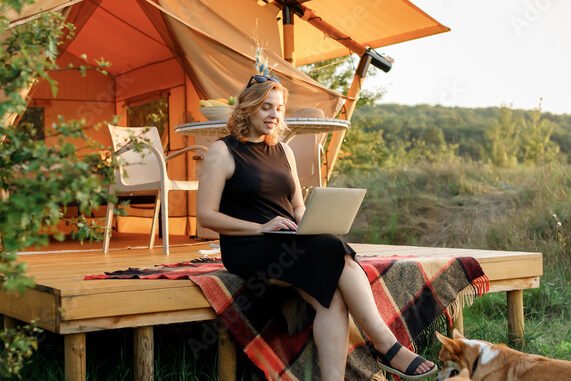If you have a passion for the outdoors and a desire to offer unique and memorable experiences to travelers, starting a glamping business can be an exciting and rewarding venture.
Many travel and leisure business entrepreneurs also looking for how to start a glamping business, which combines glamour and camping, has gained popularity in recent years as an alternative form of accommodation that allows guests to immerse themselves in nature while enjoying the comforts and amenities of a hotel.
In this article, we will explore essential tips and considerations to help you successfully start your own glamping business.

How to Start a Glamping Business Few Easy Steps
1. Research and Planning
Before diving into the glamping business, it’s crucial to conduct thorough research and develop a comprehensive business plan. Consider the following aspects and how to start a glamping business
- Market Analysis: Research the demand for glamping in your target location. Analyze the local tourism industry, competition, and target audience to identify opportunities and gaps in the market think criticaly every aspects of and minute details before how to start a glamping business.
- Location Selection: Choose a picturesque and accessible location that offers natural beauty and attractions. Consider factors such as proximity to popular tourist destinations, local regulations, and availability of amenities and services.
- Accommodation Options: Determine the types of accommodations you want to offer, such as safari tents, yurts, treehouses, or eco-pods. Assess the feasibility, costs, and market demand for each option.
2. Legal and Regulatory Compliance
Complying with legal and regulatory requirements is crucial for operating a glamping business. Some important considerations before how to start a glamping business include:
- Permits and Licenses: Research and obtain the necessary permits, licenses, and certifications required by local authorities. This may include zoning permits, health and safety certifications, and business licenses.
- Insurance Coverage: Protect your business and guests by obtaining comprehensive insurance coverage. Consider policies such as property insurance, general liability insurance, and workers’ compensation insurance.
3. Infrastructure and Amenities
Creating a comfortable and enjoyable glamping experience requires attention to infrastructure and amenities. Consider the following:
- Accommodation Design: Design your accommodations to provide comfort, aesthetics, and a connection to nature. Incorporate features such as comfortable bedding, proper ventilation, and beautiful views.
- Facilities and Amenities: Enhance the guest experience by providing well-maintained bathroom facilities, communal areas, and outdoor spaces. Consider amenities such as campfire pits, picnic areas, or wellness facilities.
4. Sustainability and Eco-Friendliness
Incorporating sustainable practices into your glamping business not only benefits the environment but also appeals to eco-conscious travelers. Consider the following:
- Sustainable Design: Utilize eco-friendly materials and energy-efficient technologies in your accommodations. Consider renewable energy sources and implement waste management practices.
- Nature Conservation: Encourage guests to respect and appreciate the natural surroundings. Offer educational opportunities, nature walks, and wildlife observation programs to promote environmental awareness.
5. Marketing and Promotion
Effectively marketing your glamping business is essential for attracting guests and building brand awareness. Consider the following strategies:
- Online Presence: Create a visually appealing and user-friendly website that showcases your accommodations, amenities, and unique features. Utilize social media platforms and online travel agencies to reach a wider audience.
- Targeted Marketing: Identify your target audience and develop marketing strategies tailored to their interests and preferences. Collaborate with travel bloggers, influencers, and local tourism organizations to expand your reach.
- Guest Reviews and Testimonials: Encourage satisfied guests to leave reviews and testimonials on platforms such as TripAdvisor or Google My Business. Positive reviews and word-of-mouth recommendations can significantly impact your business.
6. Exceptional Guest Experience
Providing exceptional guest experiences is crucial for the success and reputation of your glamping business. want to know more about how to start a glamping business Consider the following:
- Personalized Service: Offer personalized services and unique experiences to make guests feel special and create lasting memories. Tailor activities, amenities, and packages to meet individual preferences.
- Staff Training: Invest in training your staff to deliver outstanding customer service. Emphasize the importance of attentiveness, friendliness, and knowledge about local attractions and activities.
7. Continuous Improvement
To stay competitive and meet evolving guest expectations, embrace a culture of continuous improvement. Consider the following:
- Guest Feedback: Encourage guests to provide feedback and actively listen to their suggestions. Use feedback to identify areas for improvement and implement necessary changes.
- Innovation and Creativity: Stay updated on industry trends, new technologies, and innovative practices. Continuously seek ways to enhance the guest experience and differentiate your business from competitors.
Starting a glamping business requires careful planning, attention to detail, and a dedication to creating exceptional guest experiences.
By following these essential tips and considerations on how to start a glamping business, you can lay a strong foundation for a successful and thriving glamping venture.
Embrace the beauty of nature, provide comfort and luxury, and offer guests an unforgettable glamping experience. Good luck on your glamping business journey!